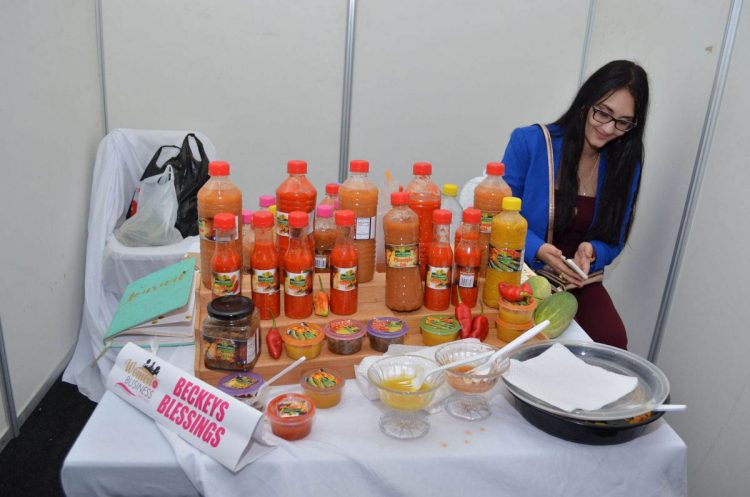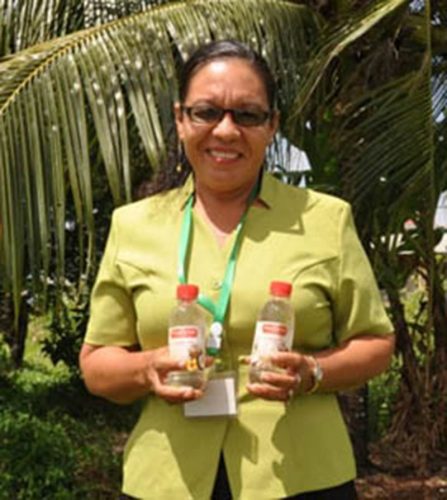Evidence of the ever growing food security challenges facing countries in the Caribbean has become even more apparent with the onset of the coronavirus pandemic and its impact on jobs coupled with the closure of a number of micro and small businesses and the impact of this on a significant number of family incomes. With significant numbers of now unemployed Caribbean people who are also living below the poverty line now finding it difficult to survive, Caribbean governments are challenged to respond to this reality.
Limited alternative opportunities to sustain themselves and their families mean that for many Guyanese the options repose, in large measure, in agriculture. Accordingly, a huge responsibility now rests on the shoulders of regional agriculture, whether through single-plot triers or established farmers to develop an enhanced level of interest in looking to the land.

Turnover and profits in the agricultural sector can be realized and markets can be grown by adding value to farm produce through the utilization of agro-processing techniques that result in increased output and reduced loss. The term agro-processing embraces processes that are employed to produce commodities that derive from farm produce through the utilization of varying levels of processing. In Guyana and other parts of the Caribbean agro-processing is believed to have derived from domestic kitchen experiments employed mostly (though not exclusively) by housewives.
One of the simplest examples that one can find of this pursuit can be found in the ‘processing’ that transforms fruit like pineapple, guava and mango into jams, jellies and other kinds of condiments and spreads. Over time, these culinary ‘inventions’ have moved beyond home use, metamorphosing into various levels of retail enterprise, first, by micro businesses and these days, through more established business outlets. Indeed, it is entirely fair to say that agro-processing has, these days, metamorphosed into a multi-billion industry, their value having been enhanced and upgraded through the application of sophisticated processing, packaging and labeling for local and external markets.

Contemporary agro-processing is defined as “a set of techno-economic activities carried out for conservation and handling of agricultural produce to ensure that such produce can become useable as food.”
In Guyana agro-processing has established itself as a significant industry, creating entrepreneurial openings that have attracted varying levels of investment – from a few thousand dollars to millions of dollars, creating opportunities for investors across the range of affordability.
The linkage between agro-processing and farming has also created significant openings for the country’s agricultural sector that have extended beyond the cultivation and consumption of unprocessed fruits and vegetables. What agro-processing has done is to take agriculture to what one might call ‘the next level,’ not only creating justification for significant expansion in cultivation but also creating opportunities for diversification into a new and lucrative industry, to say nothing about the obvious job-creation openings that has arisen out of the pursuit.
Evidence of this is to be found, first, in the significant new demand for local fruits and vegetables that go beyond consumption in their original state as well as the significant numbers of Guyanese, particularly women, who have taken to agro-processing. One might add that the advent and growth of the agro-processing sector has resulted in the significant increase in the price of fruit, much to the regret of the many consumers who favour fruit in their original state.
The growth of the agro-processing sector has not been without its challenges for the wider fruit and vegetables sector. Among those are:
1. Continually growing pressure on farmers to increase the volumes of fruit and vegetables in order to satisfy both the traditional consumer market as well as the increased demand arising out of the emergence of agro-processing;
2. The need to produce fruit and vegetables that reach the quality standard which the agro-processing sector requires;
3. Improved methods of handling, packaging and transporting of fruit to minimize damage.
The advent of agro-processing has also given rise to the need for both farmers and Agro-Processors to become proficient in the various quality standards, including phyto-sanitary standards necessary to create end products that satisfy both local and export food safety requirements, become aware of quality standards associated with considerations such as packaging and labelling (which are key requirements for export acceptance)
Affordability considerations associated with the acquisition of the requisite machinery and other inventory necessary for efficient, high quality production has meant that there are few large-scale Agro Processors operating in the sector, the majority operating at micro, small and medium-scale levels.
In Guyana, small and medium-scale agro-processing investments have been considerably strangled in terms of growth since these have largely failed to attract significant levels of either investment beyond their original owners or lending through the banking sector. For the most part, they have had to depend on personal finances, family contributions and modest loans, a circumstance that has rendered them vulnerable to sudden and swift collapse as has been the case of some enterprises in the wake of the COVID-19 pandemic. Perhaps more significantly, governments’ lip service to the virtue of expanding the local small business sector has not been matched by significant corresponding investment in the sector, the creation of institutions like the Small Business Bureau (SBB) falling sufficiently short of providing adequate support for small and micro businesses to the extent where some business owners have been openly expressing their lack frustration with the inability of the SBB to meet their investment requirements. The various other borrowing sources that are available in the private sector are inclined to seek risk-mitigating assurances that are frequently way outside the reach of potential borrowers.
Limited state-supported opportunities for small operators in the agro processing sector to access regional marketing opportunities through regional and international product displays have created strictly limited opportunities for some small businesses in the agro-processing sector to benefit from exposure to more potentially lucrative markets. These, however, have not been attended by a broader and more sustained and state-supported
marketing ‘engine,’ that allows high-quality agro-produce to benefit from sufficient sustained exposure to the more lucrative markets. In those limited instances where external market interest has metamorphosed into concrete requests for product supply local producers have almost always failed to meet both the product presentation and quantity requirements that satisfy the demands of the international market. Perhaps more to the point, government, in these instances have neglected to ‘step up’ to help these small businesses.
On the whole, the experience of the local agro processing sector is teeming with instances in which potential opportunities for possible significant external market access have been torpedoed by one of another limitation. Numbered among these have been failure to meet stipulated production (and by extension) quality standards and deficiencies in packaging and labelling requirements. What has to be said here is that government has neglected to seize upon these situations to provide adequate support for these businesses, failing miserably to recognize that such gestures can, incrementally, serve to open a floodgate to significant market-related accomplishments for the sector as a whole.
The limitations that have resulted in lost external market opportunities for local agro-produce and by extension for the growth of those enterprises has derived largely from a lack of state support for those enterprises. Growing our agro-processing enterprises into world class businesses cannot be accomplished by the strictly limited support afforded them through institutions like the Guyana Marketing Corporation (GMC) and the Small Business Bureau. These, in themselves, are limited in both their capacity and their resources. At a time when the emergence of the oil and gas sector will inevitably attract significantly greater enhanced attention to the country’s economic sectors, as a whole, it is government that needs to ‘step up’ in terms of providing resources that allow the sector to grow.









